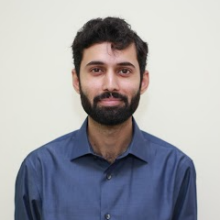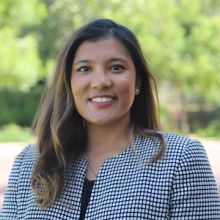Mind, Behavior, and Development
Team

Zeina Afif
Zeina Afif is a Senior Social Scientist with the World Bank’s Mind, Behavior & Development Unit (eMBeD), within Development Impact (DIME) at the World Bank. Zeina is currently working on applying behavioral insights to improve women’s access to finance and jobs, reduce youth unemployment, reduce gender based violence, promote social cohesion, and improve access to public services and programs in the Middle East and North Africa, as well as Latin America & Caribbean region. Prior to joining the team, Zeina provided operational communication and behavioral insights support to World Bank projects and has worked in countries such as Egypt, Indonesia, Iraq, Kuwait, Oman, and Yemen in the areas of taxes, social protection, social accountability, and citizen engagement. Zeina holds a MBA from George Washington University, and a M.Sc. in Behavioral Science from London School of Economics.

Jorge Luis Castaneda
Jorge Luis Castaneda is a Behavioral Economist with the Mind, Behavior & Development Unit (eMBeD), at the World Bank’s Development Impact (DIME). His work integrates behavioral sciences into the design of anti-poverty policies in a wide range of policy issues, such as education, employment, environment and climate change. He has acquired extensive experience in experimental economics, impact evaluation, econometric analysis, and qualitative research throughout his career. He previously served as a Research Fellow with the Social Sector at the Inter-American Development Bank. He holds a B.A. and a M.Sc. in Economics from the Universidad de Los Andes, Colombia.

Mohamad Chatila
Mohamad Chatila is a Behavioral Scientist with the World Bank’s Mind, Behavior & Development Unit (eMBeD), within Development Impact (DIME) at the World Bank. He has six years of experience in designing and analyzing quantitative and qualitative research tools. He previously served as a Research Analyst with ARK Group, the role involved the design and analysis of several research instruments that measured social cohesion and other constructs that contribute to conflict in the Arab region. Also served as a Research Analyst with several UN agencies operating out of Lebanon including UN-ESCWA, the ILO, and IOM. Primary areas of focus include: assessing the impact of the influx of Syrian refugees on host states, conducting desk reviews on various topics such as the perception of safety and security in the Arab Region (based on the Arab Barometer Report), and authoring several background and working papers. He served as the Danish Refugee Council’s Protection Analyst in Lebanon; this role required the production of monthly Protection Monitoring reports as well as designing surveys, Focus Group Discussions, and semi-Structured Interviews. He served as an economist (consultant) for the West Asia North Africa Institute, a regional policy think tank based in Amman, Jordan. Responsible for the production of a 30-page report on “Integrating Syrian Refugee Labour into the Lebanese Labour Market”, as well as a statistical model that predicts the point of refugee protraction.

Zain Chaudhry
Zain Chaudhry is a behavioral economist with the Mind, Behavior & Development Unit (eMBeD), at the World Bank’s Development Impact (DIME). His research investigates questions about state capacity and governance in human resource management, education, health, and other domains. In some of his work, he investigates how community health workers' performance can be improved using individually-customized behavioral contracts, how a cash transfer program affects trust in the state and vaccine take-up, and how a door-to-door political campaign affects vote shares and turnout. He uses rigorous quantitative statistical methods, such as Randomized Controlled Trials and quasi-natural experiments using self-designed surveys, lab-in-the-field experiments, and administrative data. He holds a Ph.D. in Economics from Heidelberg University, Germany.

Abigail Dalton
Abigail Dalton is a Senior Operations Officer with the Mind, Behavior, and Development (eMBeD) Unit in Development Impact (DIME). She has been with the World Bank since 2017, first with eMBeD, and later with the Gender Group coordinating work on social norms, behavior change, and economic empowerment. Previously, she was the Assistant Director of the Behavioral Insights Group (BIG) at Harvard University, where she managed a team of faculty and students engaged in behavioral science research for the public good. She holds a B.A. from Wellesley College, and an Ed.M. in Higher Education from the Harvard Graduate School of Education.

Samantha De Martino
Samantha De Martino is an Economist for the World Bank’s Mind, Behavior, and Development Unit (eMBeD), housed within Development Impact (DIME). She leads work in Mindsets and Measurement; specifically, by developing and testing new measures for understanding behavior as well as developing innovative public goods tools which leverage disruptive technology using insights from neuroscience, psychology, applied microeconomics, and public policy for the advancement of behavioral policy implementation. In addition, Samantha’s leads teams to create evidence on “what works” in behavioral policy design and implementation, especially in the thematic areas of youth employment and labor, education, and climate change with a focus in the Africa region. She has extensive qualitative and quantitative experience using psychometrics and econometrics, as well as providing technical assistance to client countries, in impact evaluation design, implementation, and measurement of interventions for policy issues including climate change, energy and environment, land reform, health, education, anti-poverty, youth unemployment and social protection in Africa, Latin America, East Asia, Eastern Europe and Central Asia with the World Bank, Institute of Development Studies, Innovations for Poverty Action, and the City of Cape Town. She holds a master's degree from Johns Hopkins University and PhD in Economics from the University of Sussex.

Michelle Dugas
Michelle is a behavioral scientist with the World Bank’s Mind, Behavior & Development Unit (eMBeD), within Development Impact (DIME). Her current work focuses on applying behavioral insights to improve health and environmental outcomes. Prior to joining the Bank, she worked as a senior research scientist at the University of Maryland’s Center for Health Information and Decision Systems leveraging behavioral science, technology, and analytics to solve healthcare challenges. She holds a Master’s and PhD in social psychology from the University of Maryland and a BA from the University of Ottawa.

Jonathan Karver
Jonathan is an Economist with the Mind, Behavior and Development Unit (eMBeD) within Development Impact (DIME), where he leads the growing portfolio on behavioral insights for tax compliance and contributes to the green agenda (particularly around sustainable heating and energy efficiency), among others. He joined the World Bank in 2016, when he conducted analytical work on poverty and inequality in the Europe & Central Asia (ECA) region. He has provided leadership and supporting roles for various impact evaluations and other analytical work related to education, household finance, fiscal policy, water and sanitation, and sexual and reproductive health, among others. Prior to joining the World Bank, Jonathan collaborated with the Inter-American Development Bank, the Mexican Ministry of Education, and the Center for Global Development. He holds a Masters in Economics from the Instituto Tecnológico Autónomo de México (ITAM).

Sayan Kundu
Sayan Kundu works with the World Bank’s Mind, Behavior & Development Unit (eMBeD), within Development Impact (DIME). In his current role he supports the diagnostic, design, and evaluation of behavioural science interventions targeting infant and mothers’ nutrition in India and Bangladesh. He has also worked with various World Bank projects in the past involving sugarcane farming in Uganda and youth-centred community development in Jamaica. He has previously worked as an M&E professional in various countries in North America, Africa, and South-Asia spanning fields like labor markets, gender and violence, financial inclusion, and public health with organizations like J-PAL, IPA, and IFMR. His primary research interests are in post-conflict governance and peace building with strong focus on gender, governance, and public health. Sayan is trained as an economist and public policy professional.

Rhys Lim
Rhys Lim is a Digital Media Behavioral Scientist with the World Bank’s Mind, Behavior, and Development Unit (eMBeD), within Development Impact (DIME). Rhys’s research investigates how to help individuals, communities, and organizations better prevent, prepare for, respond to, and recover from risks and crises (such as public health risks, climate change, automation, aging, and migration). His research uses mixed methods, including quantitative, qualitative, and computational methods. Before joining the Bank, he worked at the Inter-American Development Bank (IDB), Korea International Cooperation Agency (KOICA), University of Maryland, National Consortium for the Study of Terrorism and Responses to Terrorism (START), Ketchum, and Burson-Marsteller. He holds a Ph.D. in Communication from the University of Maryland, College Park.

Nour Nasr
Nour Nasr is a behavioral scientist with World Bank’s Mind, Behavior & Development Unit (eMBeD), within Development Impact (DIME), based in Beirut, Lebanon. Before joining the Bank, she served as Associate Director and Head of Research at the Arab Foundation for Freedoms and Equality, working on knowledge production and movement building around gender, sexuality, and bodily rights in the Middle East and North Africa. She has taught Psychology, Organizational Psychology, and Gender at the American University of Beirut and the Lebanese American University until 2017. For more than 10 years, her work has focused on gender and its intersectionality with migration, economic empowerment, and minority rights in the Middle East. Nasr holds an MSc. in Organizational and Social Psychology from the London School of Economics and an MRes. in Management and Innovation from SKEMA Business School.

Daniel Alejandro Pinzón Hernández
Daniel Alejandro Pinzón Hernández is a behavioral scientist for the World Bank’s Mind, Behavior, and Development Unit (eMBeD), within Development Impact (DIME). Before joining the bank, he was a researcher at Universidad de Los Andes, Colombia, working on measures of socioemotional skills, personality traits, mental health, and early childhood development. His work involves methodological design of hard and soft skills for policy and research in developing countries, psychometrics, and behavioral measures. His primary areas of research includes education, psychometrics, survey design and early childhood development. He holds a M.Sc. in Economics from Universidad de Los Andes, Colombia.

Dana Qarout
Dana Qarout is a Research Analyst with the Mind, Behavior & Development Unit (eMBeD), at the World Bank’s Development Impact (DIME). Dana works on behavioral diagnostics and interventions, with a specific focus on gender-related issues and women’s economic empowerment. She is currently working with the Mashreq Gender Facility (MGF) in Lebanon, Iraq and Jordan where she provides technical assistance to local governments on developing and evaluating the impact of behavioral campaigns. In addition to her work on gender issues, Dana has also worked on public governance research and education, looking into the performance of government bureaucracies in developing countries. She has a Master of Public Policy from the Blavatnik School of Government at the University of Oxford and holds a Bachelor's degree in Foreign Service from Georgetown University in Qatar.

Tasmia Rahman
Tasmia Rahman is a Behavioral Scientist at the World Bank’s Mind, Behavior & Development Unit (eMBeD), within Development Impact (DIME). Her work includes designing and evaluating behavioral interventions across various policy areas, such as labor and entrepreneurship, social protection, financial inclusion, social norms, and health and nutrition. Prior to joining the Bank, she worked on impact evaluation and implementation of labor market, tax compliance, and digital finance projects in East and West Africa and South Asia with the Georgetown University Initiative on Innovation, Development and Evaluation (Gui2de) and BRAC. She holds a Masters in International Development Policy from Georgetown University.

Ana María Rojas Méndez
Ana María Rojas Méndez is a behavioral economist with the Mind, Behavior & Development Unit (eMBeD), at the World Bank’s Development Impact (DIME). Her work integrates behavioral sciences, development economics, and impact evaluations to tackle a wide range of public policy challenges regarding health, gender, migration, taxation, and transportation. Prior to eMBeD, she was a Senior Behavioral Fellow at the Inter-American Development Bank's Behavioral Economics Group, where she led the creation and dissemination of the first free online "Behavioral Economics Course for Better Public Policies" in Spanish and Portuguese, with more than 6,000 trained public servants since its launch in 2020. Ana Maria also worked at Innovations for Poverty Action developing and managing the migration portfolio of projects in Colombia. Ana Maria received a Master in Public Administration in 2018 from the John F. Kennedy School of Government at Harvard University. She holds a Master and a Bachelor’s degree in Economics from Universidad de los Andes in Bogotá, Colombia.

Juni Singh
Juni Singh is an Economist with the Mind, Behavior, and Development (eMBeD) unit in Development Impact (DIME) working on Europe and Central Asia. She is also a lecturer at Caltech on Economics of Sustainability. She specializes in behavioral and development economics, focusing on delivering quality interventions in developing economics. Her research particularly focuses on social interactions and their impact on economic decisions. She merges field experiments, randomized control trials, and theoretical methods to generate evidence for policy making. She believes that effective policies can be designed with the correct set of incentives. Her research interests are in entrepreneurship, gender, climate change and social networks. She has over six years of experience managing and conducting research projects in the field that span a wide range of topics. She has collaborated with government counterparts and researchers from across the world. Dr Juni has a Ph.D. in Economics at the Paris School of Economics.

Ailin Tomio
Ailin is a behavioral scientist with the Mind, Behavior, and Development Unit (eMBeD), within Development Impact (DIME). She works on issues related to environment and greening transitions, social inclusion and urban development. Before joining the team she worked as a senior behavioral consultant for PAHO, advising on how to tackle misinformation with behavioral tools, and for the IADB where she advised on several projects related to health and social inclusion. She also worked for the Buenos Aires City Government as User Research Manager focusing on applying Design Thinking and behavioral tools to improve citizens' experience of public programs. She holds a Master’s in Social and Consumer Psychology from New York University and an B.A. in Psychology and Neuroscience from the Favaloro University, Argentina.

Renos Vakis
Renos Vakis heads the Mind, Behavior, and Development Unit (eMBeD) within Development Impact (DIME), where he uses behavioral science to formulate anti-poverty and pro-equity policy solutions. His work spans a diverse range of policy issues, including financial inclusion, climate change, social cohesion, human development, and misinformation. Renos has written about poverty dynamics and mobility, aspirations, mental well-being, and social protection, while also examining the biases of policymakers. He has led numerous randomized trials to evaluate development interventions across various regions. Renos has lectured at institutions like Johns Hopkins University (SAIS) and the University of Cyprus. His holds a Ph.D. from the University of California, Berkeley.
